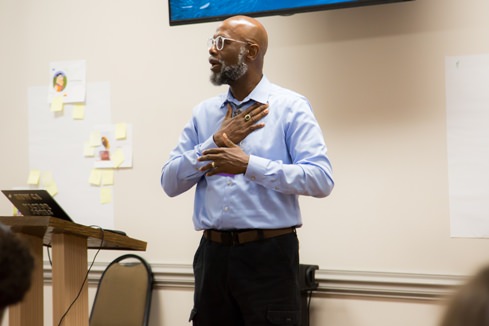Reflective Supervision / Consultation (RSC)
What is Reflective Supervision / Consultation?
RSC is an ongoing professional development practice for the infant and early childhood (IEC) workforce. RSC supports the professional in addressing the challenges of their work and leads to better service to families. The relationship, in which the professional feels seen, heard, and understood, provides a model for strengthening relationships and promoting the growth and development of babies, young children, their parents, and caregivers.
Concretely, RSC provides a regular opportunity for a professional to talk about their work and the impact their work has on themselves and others. RSC fosters critical self-awareness and the ability to consider multiple perspectives, all of which enhances an professional’s capacity to implement relationship based services and supports or an organization’s capacity to create a relationship informed culture (Alliance for the Advancement of Infant Mental Health, 2023).
How does Reflective Supervision / Consultation work?
Through regularly scheduled reflective sessions, the professional and their reflective supervisor, mentor, or consultant establish a collaborative and reflective alliance. The RSC process offers opportunities to explore relationships at every level, encompassing those between programs and supervisors, supervisors and providers, providers and caregivers, and caregivers and little ones within the parallel process. The RSC relationship itself (characterized by a sense of being seen, heard, valued, and supported) serves as a model for strengthening relationships that foster healthy development for babies, young children, and their caregivers. The end goal is for this reflective process to shed light on how programs, supervisors, and professionals can leverage relationship-based interventions to create positive change and achieve desired outcomes.
Reflective supervisors and consultants adopt a collaborative approach, where they actively listen and give the supervisee time to reflect. This guides the supervisee to discover solutions, concepts, and perceptions on their own. This trust in the supervisee’s ability to self-discover fosters a sense of empowerment and ownership over their own professional development.
What are the benefits of RSC?
Reflective Supervision / Consultation helps you understand your own thoughts and feelings, and how they affect your work with children and families. It helps you see how your relationships, personal experience, and bias may impact your actions. This self-awareness is a key component of culturally responsive infant and early childhood mental health services. Proper RSC results in high quality services to infants, young children, and those that care for them. It also provides a safe outlet for the stress that can come with the job.
Reflective Supervision / Consultation can help:
- Improve self-awareness
- Enhance problem-solving skills
- Promote cultural humility
- Improve emotional regulation
- Strengthen relationships
- Increase job satisfaction
- Reduce stress and burnout
NCIMHA believes that all professionals need and deserve the support that RSC can provide.
Are you providing Reflective Supervision / Consultation?
Characteristics
- Reliable and predictable
- Present and attuned
- Able to maintain confidentiality
- Honest and respectful
- Open and curious
- Able to hold ambivalence
- Focused on feelings
Objectives
- Form a trusting relationship between supervisor and supervisee
- Establish consistent and predictable meetings
- Ask questions that encourage details about the child, parent / caregiver, and emerging relationship
- Support the integration of emotion and reason
- Attend to how reactions to the content of the work affect the process
- Explore the parallel process
- Build and nurture supervisee’s capacity to understand the meaning, feeling or intention behind their behavior and the behavior of others with whom they are working
When is RSC required for Endorsement?
RSC is a key component of high quality infant and early childhood mental health services across disciplines and sectors, and therefore is a key piece of IECMH Endorsement.
Reflective Supervision / Consultation is strongly encouraged for all applicants, but is required in applications for the following categories of Endorsement: Infant Family Specialist (IFS); Early Childhood Family Specialist (ECFS), Infant Mental Health Specialist (IMHS); Early Childhood Mental Health Specialist (ECMHS), Infant Mental Health Mentor-Clinical (IMHM-C), and Early Childhood Mental Health Mentor-Clinical (ECMHM-C).
Requirement by Category
Footnotes:
[1] Endorsed Reflective Supervisor (ERS) is available as an add-on for the Family Specialist and Mental Health Specialist Endorsements, and for applicants that are currently providing Reflective Supervision / Consultation (RSC).
Not sure where you fit in?
We can help! Click the Learn More button to visit our Categories and Requirements page for an explanation on the categories of Endorsement as well as our Getting Started Guide. And you can always reach out to our staff for guidance.



